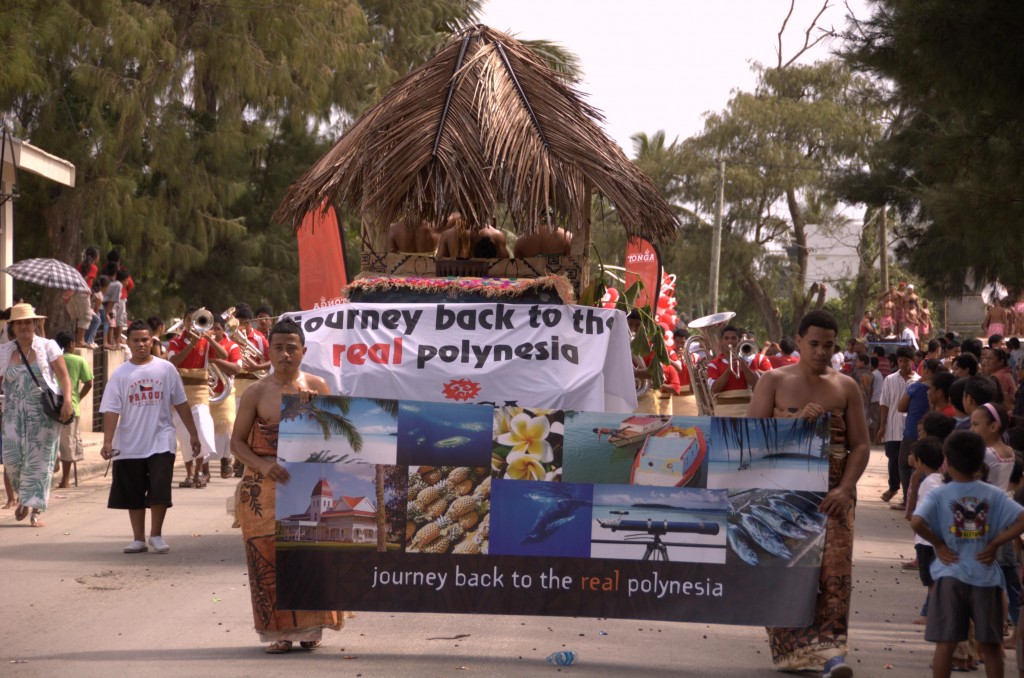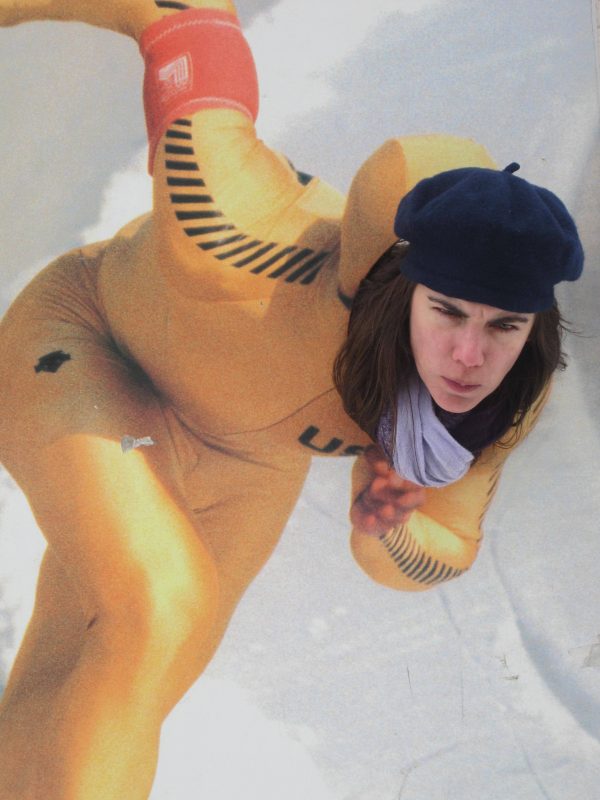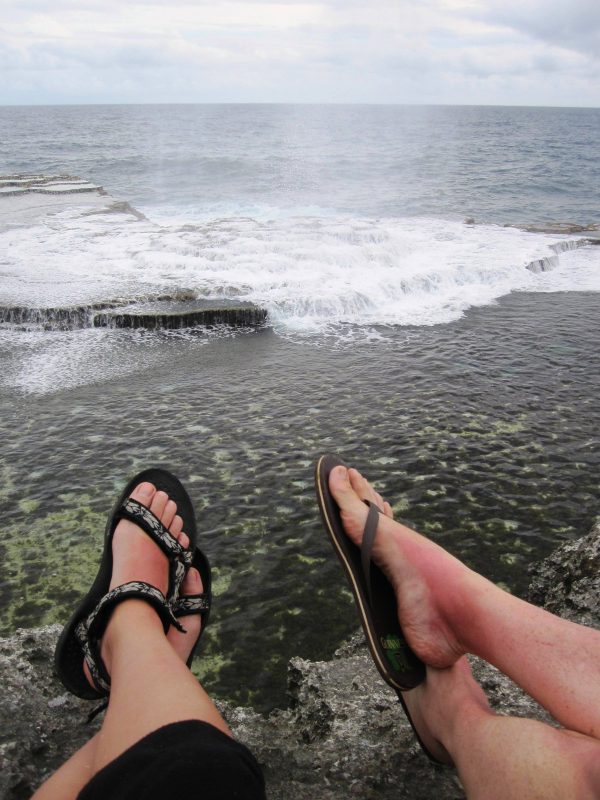It has been a month since my last post — about time to add something new!
So, Sam and I left Tonga on February 23rd, and due to the magic of time zones, arrived the same day in the US-of-A. It is wonderful to see friends and family members on the gulf coast (where we landed) and there are family members we’ve not yet had a chance to see elsewhere on the continent, but aside from reunions, here are a few things we’ve noticed since arriving:
1. As I write this, I am listening to a big-band mix on Pandora (specifically, “I Won’t Dance” by Fred Astaire, but I prefer the version by Blossom Dearie). Loving it. Pandora and Netflix and all kinds of other forms of digital entertainment that are pirate-free are as of yet a nebulous concept in The Kingdom that stalls upon the idea of affordable internet, among other things.

2. Fruit and veggies, as a general rule, just don’t taste as good here as they do in Tonga. For example, the first week back, Sam got really excited upon shopping at Walmart and spotting a pineapple. “Oh, let’s buy it!” he exclaimed, promptly followed by a soliloquy of how much he missed his fresh fruit smoothies. So, we bought it, marveling at the cost (About 2 dollars! And all the way from Costa Rica! And the thing was huge!) Cheaper than pineapples in Tonga and maybe even prettier, too. In Tonga, except during the pineapple season — (a perplexing thing anyway because technically, from what I understand at least, pineapples in tropical climes such as Tonga shouldn’t have a “season” because the weather is perfect year-round to grow them, but that leads in to a whole other cultural aspect of togetherness and communal decision making that is far too complicated for me to opine on at the moment, and I digress) — as I was saying, pineapples in Tonga are normally $3 or more, so our Walmart find was a positive steal.
Upon buying it and chopping it up however, we both noted how the taste was remarkably inferior. Sort of a chemically-pineapple-taste with a whole lot of bland mixed in. We think it is because the pineapples must be picked prematurely, which doesn’t make a lot of sense because we read that pineapples stop maturing upon picking (unlike other fruits, like bananas). In any case, boo, America. Tonga has you totally beat! And it isn’t just tropical fruit, either. I bought a whole bunch of broccoli — it is my favorite and a rarity to find at the market in Tonga — steamed it and then immediately noticed a remarkably muted flavor. The broccoli in Tonga is usually pretty wild looking — scraggly, small and with lots of leaves, which I just cook up and eat like the florets — but definitely, far tastier.
But …
3. Food in the States is sooo much more convenient. I’ve found myself going to the grocery just for the fun of it, walking up and down the isles and marveling at all the different types of cheeses already sliced or grated, just waiting for that impulse buy! In Tonga, I’d usually buy a huge, 10-inch by five-inch by five-inch block of mozzarella cheese from the Poko store (the same place I’d often find my Coke Zero’s — and the gallon containers of ice cream!), chop it up into normal human size portions, place them in zip-locks and freeze ’em until the next pizza. And after all this, I would inevitably fail to take the cheese out of the freezer in time for pizza night, and thus contend with grating a frozen block of mozzarella, which is no easy feat!
Or, take for instance, chicken. In Tonga, I’d have to buy a big bag of frozen chicken parts still on the bone (other than seafood and eggs, there really isn’t much in the way of “fresh” protein unless you raise your own livestock — almost everything is either tinned or chopped up parts imported in big, frozen boxes), thus leaving one with the option of defrosting and baking the chicken or — and here’s my simpler option — dumping the frozen pieces into pot of boiling water and simply boiling the heck out of it until the chicken could easily be picked off the bone and then packaged and stored for future use. But here? You’ve got chicken ready any way you can imagine it. Oh, the possibilities!
And as a final example of how convenient food is here, I’ll take to task Tonga’s excellent, freshly-caught fish. No matter how delicious it may be, Tongans still haven’t grasped the concept of selling fish in “western” portion quantities. Since most Tongans prepare meals for their entire extended family and their extended family’s extended family, it seems perfectly logical to sell all fish portions by 5-kilo chunks. Unless you are buying a smaller fish such as snapper or parrot fish, you’re more or less out of luck finding tuna or marlin in any portion recognizable as a steak or fillet. I remember asking once if I could get a portion of tuna sliced in smaller steaks and when the vendor agreed, I was momentarily taken off guard. It wasn’t until I realized that “smaller” meant a two-kilo (4.4 pounds) slab of bisected tuna instead of the enormous 20-kilo midsection already on ice. Well, after a while you get pretty good at lugging the carcass home, carving out your own steaks and slipping them into freezer bags for future use. Thank goodness for that deep freezer!
4. Infrastructure in the USA is so much better. Roads are, generally, smooth and fuss free. And we have traffic lights which can be confusing after two years on an island without any! They’re also really fun. Who thought of those things, anyway? Genius!
5. Even though the Pacific islands are known for higher BMI’s, the American South doesn’t seem a whole lot different, except in Tonga, people do get out and about. It is totally normal to see rather portly men and women walking or jogging in Nuku’alofa (not that everyone here is heavy — many Tongans, especially the younger lot, are exceptionally fit.) Every day along that narrow sidewalk off Vuna Road, friends and couples and families stroll or jog for whatever length of time. In the US? At least in the southern part of the States, you really don’t see that many Americans walking or otherwise being active outdoors just ’cause.
6. Maybe for the reasons above, in general, peoples’ skin doesn’t look as good here (including my own, unfortunately). In Tonga, almost everyone has glowing skin. Probably all the sunshine and healthy oils, I suppose. Coconut oil is traditionally used on skin and in hair, so that probably has a lot to do with it. Simpler living, too. It wouldn’t be something I would have expected myself to notice straight away, but upon being here less than a week, I remember remarking upon this to Sam. Which leads to my next observation, and please note that a lot of this is prefaced upon the fact that we just finished a 2-week road trip from the south to the north for job purposes:
7. Even though the US has so much more wealth and the standard of modern living is higher, when you walk into many US service stations, you immediately note how poor the environment is for the people there. Windows are small or blocked by shelves altogether. Kind of depressing. Florescent lighting is everywhere. A definite Joe-Versus-the-Volcano feel (a highly under-rated movie in my opinion). In Tonga, shacks are the status quo, but folks have a better idea of how to bring the outside in, I think. And shops, as poor or as falling apart as they may be, have windows and doors (or none at all, like the picture above!) letting in fresh air, not to mention the beautiful trees that inevitably grace the area.
8. There are no lizards living in our house now. It feels so empty and lonely!
9. We now have a clothes drier! Doing laundry here only takes about an hour! And then, all you have to do is hang up your dry clothes when it’s all said and done. Wow, so great. And best of all, my raggedy clothes actually have a shape to them again.
In Tonga, we were so fortunate to have a washing machine, but we weren’t so lucky on the dryer. Now, most people just hang their clothes outside in Tonga, and I tried that the first two weeks we were there, but I soon discovered that our little strip of “yard” was not as fortunately situated as our neighbors’. We didn’t really have an open space that wasn’t directly under trees or an overhang, and after bringing in our laundry a few times and discovering hairy, palm-sized spiders dropping from our sheets, I started to reconsider the outdoor approach.
But the coup de gras? Well that would be one sunny afternoon when I was folding some t-shirts fresh from the laundry line and a molokau dropped from them, scurried across the floor and the crawled up my pant leg! I screamed and grabbed the only object close by, which happened to be my little, brass Turkish coffee pot, and proceeded to cudgel my leg until the beast fell to the floor. My leg was purple for a week — it probably would have been less painful to have just been bitten by that molokau! And from that day onward, I hung our towels and underwear on an inside line Sam strung up for me by the window, and then I’d put our clothes on hangers and hang them along the curtain rods until they dried. I’d hang our sheets over the banister, so that, generally speaking, our house took on the appearance of a poorly organized thrift shop.
10. We don’t have to stop for the pigs crossing the street. I miss them! Sam used do the elephant walk song when they’d trundle by — which goes perfectly with a pig’s gait if you’re ever keen to try — and it was almost as if they knew we were doing this because often, a pig would pause mid-step and glance back at as us like, “Are you making fun of me?” So hilarious. Well, maybe we’d been on the island too long after all….

11. Customer service in the US is so much better. In Tonga, it is the rare business where employees actually exchange pleasantries with the customer. And going out to eat can be a bewildering activity to those accustomed to actually being waited on. Not that every shop and restaurant is rude (and a few restaurants have excellent customer service), but rather, there is often a sense of laid-back apathy that a foreigner may mistake for hostile behavior. In the states, even if you’re driving through a fast food joint to pick up a latte, you’re typically smiled at and thanked for your business. It kind of flustered me the first time it happened once we got back here and I’m still getting used to it!
12. In the U.S., you are just another bloke! No one here regards you as a palangi or otherwise as an abnormality. You’re just an American, like everyone else. Sam and I both enjoy that feeling of being un-noticed, actually, so we are really enjoying the thrill of anonymity Sometimes, in Tonga, we both felt after a while as if we were living under a microscope. Not that we were important people there — far from it — but just being a foreigner draws a certain amount of attention.
13. Even after driving here for a few weeks, I sometimes find myself pulling out of the parking lot and onto the wrong side of the road. And almost daily, I catch myself headed to the passenger side of the car when I’m intending to drive. It can get embarrassing.
14. In general, less seems to happen in Tonga, but you notice it more. Little things make your life richer. You care more about the sunset. About how good that fish was. How the balmy breeze feels as you ride your bike down Vuna Road and how the kids at the American pier were so cute when they each took turns trying on your snorkel gear and gazing in amazement into the water.
15. Almost everything is cheaper in the States. Waaaaay cheaper. And convenient! Shops and restaurants are everywhere, open during all kinds of crazy hours and even on Sundays! In Tonga, this is what we have for convenience stores (and this is one of the fancier ones).
If you hanker for a bag of rice, a bar of Lux soap, a tin of corned beef or a frozen hunk of pig leg, you’re golden. Otherwise … forget about it! Of course, if it’s Sunday, don’t even bother with the pig leg because everything shuts down (except a few Chinese restaurants and a handful of “resorts” at various, far-flung edges of the island).
And of course, in the states, for most things, you don’t even have to leave your house! I’ve waited a year to get my hands on my favorite face cream because we simply couldn’t afford the shipping. But here in the US? Well, when we moved back into our house that has developed a few issues over the past two years, we discovered that all of our toilet tank parts had mysteriously dissolved, more or less. No idea as to why, but the salient point of this story is that one of these toilets required special parts that the local store simply didn’t carry, but all we had to do was order it online. Two days later, the package is outside our door! Pure insanity, I tell you! In Tonga, that would have taken at least a month — more like two … if it ever got there in the first place (I still have one shipment I ordered back in October of 2012 that has yet to make an appearance).
16. Over all, from the South to the North, the US is more efficient, less expensive and a lot more convenient. But Tonga has totally got something that I think we’ve forgotten in our western world. Tonga is simpler, perhaps poorer by most people’s judgement of things. Distractions are not as complicated. Life has a slower pace, obviously. But these things bring on layers of their own that, if I were to live there longer term, would have its own negative repercussions as much as its positives, I’m sure. That said, from where I sit right now, I have to admit that I miss Tonga. All the sunshine and beautiful, fresh produce. The friends we made. The perfect, aquamarine water and the relentlessly determined sun. The bicycle trip into town. The way everyone would raise their eyebrows in greeting when I rode by and the way I could never quite get that same gesture right on my own face. The coconut trees … everywhere. And the trash I complained of in previous posts? Come to find out, things aren’t whole lot better on the coast where I am presently! Well, maybe it’s a little better here, but considering the resources and infrastructure at our disposal and what we’ve done with it, I’d probably put my cards on Tonga for future sustainability.
Conclusion:
So, these are the silly little differences Sam and I have noted during our first few weeks back in the USA. I’m sure as we stay longer, more profound contrasts will sink in, but since we’re still in that limbo of reverse culture shock, it’s the best we can do at present. I’d like to add one last thing, though, and this isn’t so much a compare-contrast as it is simply an observation. Sam and I have both noticed it, and it is this: living in another culture — not visiting, not touring, not stopping by for a two-week interlude — but really living in it, is a form of time travel in a way. You exist in an alternate reality apart from anything else you’ve ever known before. You discover things about yourself, about your partner, about what matters to you both in life — little things that you would probably never discover if you had only contented yourself with being comfortable back home. And when you return to your place of origin, people who knew you from before speak in astonishment that two whole years have already gone by. To them, it seems like yesterday when you left. To you, you’ve lived a lifetime.
And maybe that’s the whole point of Tonga-time!














